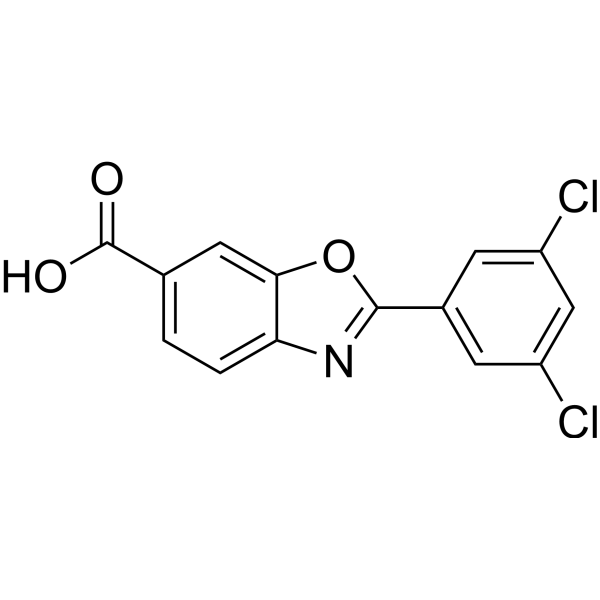Pfizer Inc. announced that the Tafamidis Phase 3 Transthyretin Cardiomyopathy study evaluating tafamidis for the treatment of transthyretin cardiomyopathy met its primary endpoint
Pfizer Inc. (NYSE:PFE) announced today that the Tafamidis Phase 3 Transthyretin Cardiomyopathy (ATTR-ACT) study evaluating tafamidis for the treatment of transthyretin cardiomyopathy met its primary endpoint, demonstrating a statistically significant reduction in the combination of all-cause mortality and frequency of cardiovascular-related hospitalizations compared to placebo at 30 months. The preliminary safety data showed that tafamidis was generally well tolerated in this population and no new safety signals were identified.

The ATTR-ACT study was designed to assess clinically meaningful outcomes for the use of tafamidis as a treatment for patients with transthyretin cardiomyopathy, a rare, fatal, and underdiagnosed condition associated with progressive heart failure.1,2 The average life expectancy for people with transthyretin cardiomyopathy is 3 to 5 years from diagnosis.3 The prevalence of transthyretin cardiomyopathy is presently unknown; however, it is estimated that less than 1% of people with the disease are diagnosed. Currently, there are no approved pharmacological medications specifically indicated for treating transthyretin cardiomyopathy.4
“These topline results are important for people with transthyretin cardiomyopathy and bring us one step closer to realizing the potential for a new treatment for those in desperate need,” said Brenda Cooperstone MD, senior vice president and chief development officer, Rare Disease, Pfizer Global Product Development. “Pfizer Rare Disease has been at the forefront of improving the understanding of transthyretin cardiomyopathy, and we thank the patients who participated in the trial and their families, as well as the physicians and investigational sites that contributed to this important study. We look forward to sharing the detailed results of the study with the cardiovascular community and discussing these data with health authorities to determine an appropriate regulatory path forward.”
“Our findings offer real hope for people with transthyretin cardiomyopathy and their families,” said Mat Maurer MD, Arnold and Arlene Goldstein professor of Cardiology, Columbia University Vagelos College of Physicians and Surgeons. “As health care professionals, all we can do right now is manage symptoms of the disease, as there are no approved pharmacological treatment options at this time. The need for medicines that treat transthyretin cardiomyopathy is critical.”
In 2011, tafamidis was granted orphan drug designation for transthyretin cardiomyopathy in both the EU and US. In June 2017, the US Food and Drug Administration (FDA) granted Fast Track designation to tafamidis for transthyretin cardiomyopathy; additionally, in March 2018, the Ministry of Labor Health and Welfare in Japan granted SAKIGAKE designation to tafamidis for this indication.
About the ATTR-ACT Study1
ATTR-ACT is a Phase 3 international, multicenter, double-blind, placebo-controlled, randomized, 3-arm clinical study in 441 patients that investigated the efficacy, safety, and tolerability of an oral daily dose of 20 mg or 80 mg tafamidis meglumine capsules compared to placebo. The study included both patients with the variant, or hereditary, form of the disease, and those with the wild-type form, which is not hereditary and may occur as people age. The primary analysis of the study, which compared tafamidis to placebo, was the hierarchical combination of all-cause mortality and frequency of cardiovascular-related hospitalizations over a 30-month period in patients with transthyretin cardiomyopathy.
For more information on the ATTR-ACT study, go to www.clinicaltrials.gov. These results are preliminary topline data and are subject to further analysis. The full data and detailed results will be submitted for presentation at an upcoming scientific congress as well as for publication in a peer-reviewed journal.
Tafamidis is an investigational treatment for transthyretin cardiomyopathy and is not approved for this indication.
Pfizer Rare Disease
Rare disease includes some of the most serious of all illnesses and impacts millions of patients worldwide,5 representing an opportunity to apply our knowledge and expertise to help make a significant impact on addressing unmet medical needs. The Pfizer focus on rare disease builds on more than two decades of experience, a dedicated research unit focusing on rare disease, and a global portfolio of multiple medicines within a number of disease areas of focus, including hematology, neuroscience, and inherited metabolic disorders.
Pfizer Rare Disease combines pioneering science and deep understanding of how diseases work with insights from innovative strategic collaborations with academic researchers, patients, and other companies to deliver transformative treatments and solutions. We innovate every day leveraging our global footprint to accelerate the development and delivery of groundbreaking medicines and the hope of cures.
Click here to learn more about our Rare Disease portfolio and how we empower patients, engage communities in our clinical development programs, and support programs that heighten disease awareness.
A further description of risks and uncertainties can be found in Pfizer’s Annual Report on Form 10-K for the fiscal year ended December 31, 2017 and in its subsequent reports on Form 10-Q, including in the sections thereof captioned “Risk Factors” and “Forward-Looking Information and Factors That May Affect Future Results”, as well as in its subsequent reports on Form 8-K, all of which are filed with the U.S. Securities and Exchange Commission and available at www.sec.gov and www.pfizer.com.
References
________________________1Data on file. Pfizer Inc. New York, NY.2THAOS - Transthyretin Amyloidosis Outcomes Survey. Disease Background - transthyretin amyloidosis. https://www.thaos.net/Physicians/DiseaseBackground.cfm. Accessed March 13, 2018.
3Connors LH, Doros G, Sam F, Badiee A, Seldin DC, Skinner M. Clinical features and survival in senile systemic amyloidosis: comparison to familial transthyretin cardiomyopathy. Amyloid. 2011;18(sup1):157-159. doi:10.3109/13506129.2011.574354059
4Ando Y, Coelho T, Berk JL, et al. Guideline of transthyretin-related hereditary amyloidosis for clinicians. Orphanet Journal of Rare Diseases. 2013;8(1):31. doi:10.1186/1750-1172-8-31.
5Pfizer Inc. Rare disease. http://www.pfizer.com/health-and-wellness/health-topics/rare-diseases/areas-of-focus. Accessed March 9, 2018.
Thursday, March 29, 2018
https://www.pfizer.com/



